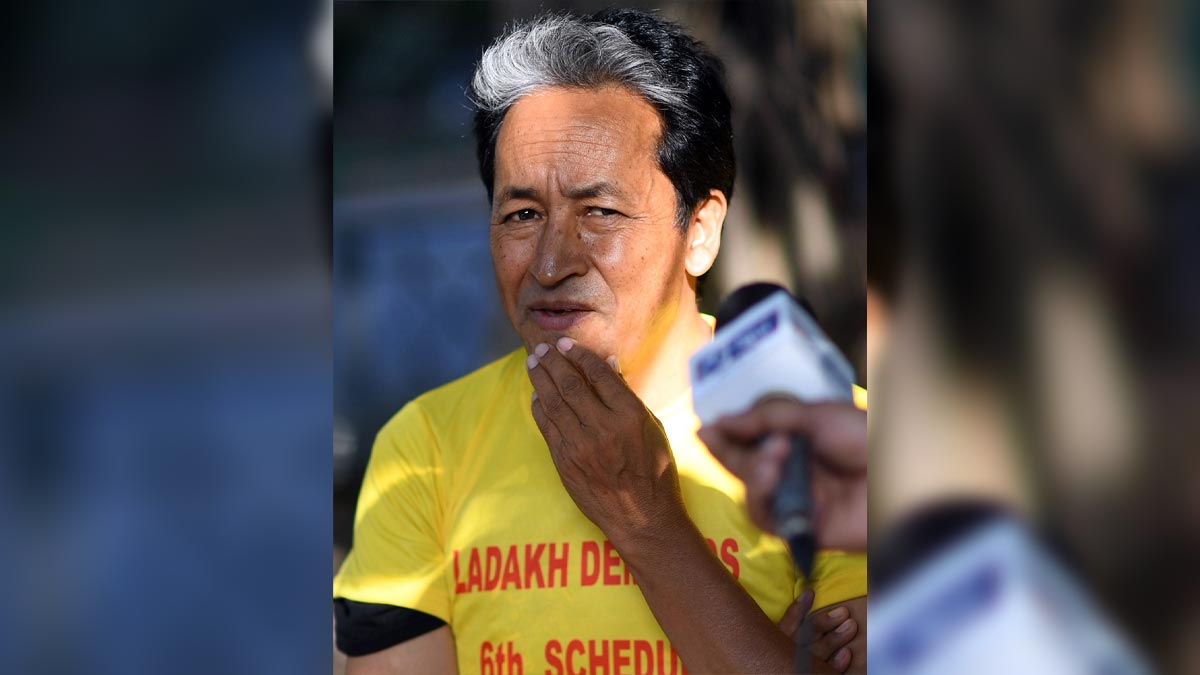Interview/ Sonam Wangchuk, climate activist
LADAKH WAS IN the news recently, as climate activist Sonam Wangchuk, who is the Union territory’s most recognisable figure, undertook a trip to Delhi on foot to draw attention to the ecologically fragile Himalayan region. He is advocating for Ladakh’s inclusion in the Sixth Schedule of the Constitution, which allows for the formation of autonomous district councils that possess the authority to regulate matters such as forestry, health care, land use, social customs, mining and policing. Wangchuk says indigenous communities should determine their own development models. Upon arriving in Delhi, Wangchuk was detained as he sought a venue to protest and also a meeting with president, prime minister or home minister. When his demand was not met, he launched a sit-in at the Ladakh Bhawan in Chanakyapuri, surprising the authorities.
Wangchuk, 58, has worn many hats: engineer, educator, climate warrior and now social activist. He says he has no political ambitions. “I would rather influence the entire population than be associated with one party,” he told THE WEEK in an exclusive interview. Excerpts:
Q/ After the abrogation of Article 370, you got a separate identity, but lost certain safeguards you enjoyed.
A/ It is a transition period. So I won’t judge it from the current situation. We are very hopeful that we will have what we want very soon.
Q/ There is often debate on the safeguards under the Sixth Schedule versus development.
A/ It is like the British saying that if we grant India freedom, there will not be any development, so we better keep it a colony. The Sixth Schedule has nothing to do with development. The only difference is that under the Sixth Schedule, development will happen in consultation with local people. If local people so desire, they can have industries or allow mining, but they will check whether it helps them or harms them, which unscrupulous corporates and officials with two-year terms will not check.
Q/ Ladakh is known for its cultural traditions and tourism. How will Sixth Schedule help?
A/ Its impact will be very positive. Indigenous people can decide on their own culture, environment, land and forests. They will preserve and maintain it. And that’s what tourists are interested in.
Also Read
- Jammu-Kashmir and Haryana assembly election results: Dear politicians, hear the people's voice
- J&K: Abdullahs return to power after 16 years, but Omar will have to walk the tightrope
- 'Election result a rejection of what BJP has done to J&K': Omar Abdullah
- Decoding Haryana and Jammu-Kashmir assembly election results
- How BJP beat anti-incumbency in Haryana
- How BJP is working to consolidate its future after Lok Sabha debacle
Q/ Is there any particular model that you want to replicate?
A/ Ladakh has shown for the last 30 years since the Hill Council was formed that it can be run by Ladakhi leadership with utmost integrity. We believe that this will become an example for all the Sixth Schedule regions of the country.
Q/ There are many arguments for and against giving Ladakh statehood.
A/ Our area is large, and the population is just three lakh. Many people say we are on the sensitive border area. But the same is true for Arunachal Pradesh, Uttarakhand and Sikkim. If those can be states and enjoy democracy, then why not Ladakh?
Q/ Are you looking at a possible political role?
A/ No, not everybody is interested in a chair. There are people who want to influence the destiny of their future generations. I am here to help those who are in these positions.
Q/ The government may think why it should listen to you as there are others as well who represent Ladakh.
A/ It need not be me. It can be members of the Leh Apex Body and the Kargil Democratic Alliance, who have been in discussions with the government. It can be the MP from Ladakh. It can be all of them and they can exclude me. I don’t mind. I don’t have to be in that meeting.


